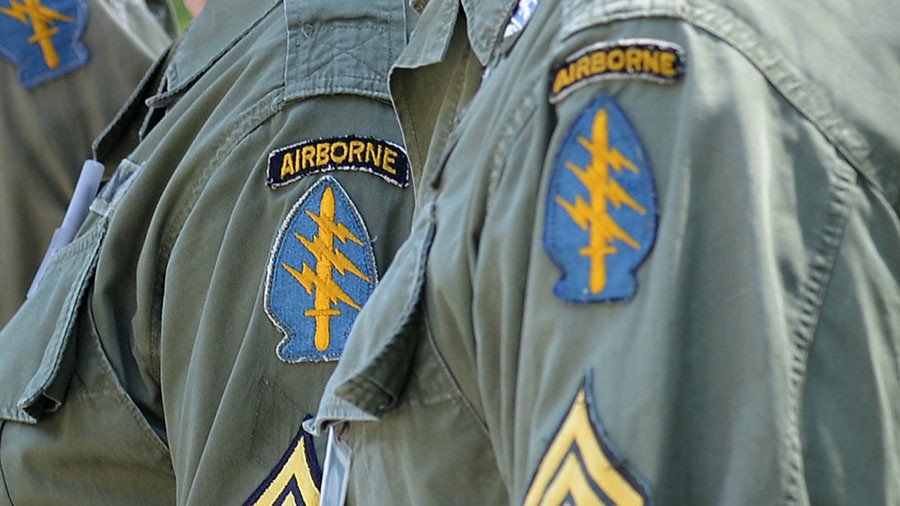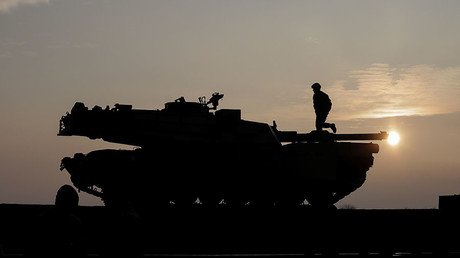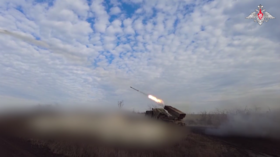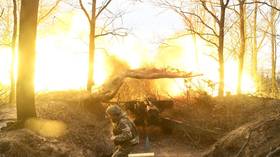US Green Berets covertly helping Saudi Arabia in Yemen – report

A team of US Army Green Berets have been covertly aiding Saudi Arabian forces in their fight against Yemeni Houthi rebels, according to New York Times sources.
A team of around 12 Green Berets arrived at the Saudi border with Yemen last December, despite Washington officially remaining uninvolved in the conflict. The commandos are reportedly helping Saudi forces to “locate and destroy” ballistic missiles and launch sites, which are used by the Houthis to strike targets within Saudi Arabia.
Sources also told the newspaper that the US troops are training their Saudi counterparts to secure the border with Yemen. There is no indication yet that their mission has taken them across the border and into Yemen itself.
Officially, American involvement in the conflict is limited to logistics and intelligence sharing. According to official figures, there were just over 500 US military personnel stationed in Saudi Arabia as of December last year.
The conflict between the Houthis and Saudi forces is a regional one, and the Houthis pose no direct threat to the United States and have not been classified by the American government as a terrorist organization.
The Green Berets will thus be likely kept out of harm’s way, at least for now. Former senior security policy analyst at the office of the Secretary of Defense, Michael Maloof, told RT that the Saudis prefer to contract out their fighting in Yemen to mercenaries, like those from Blackwater.
“The US is heavily involved in Yemen, providing armaments. But you also have the Blackwater people out of the United Arab Emirates. They have a base in Yemen and a lot of them have been killed there,” he said.
Saudi Arabia has been criticized for its heavy-handedness in Yemen. Last month, an airstrike on a Yemeni wedding party killed more than 20 people and wounded dozens of others, apparently using US-made munitions. In the early stages of the conflict, one-in-three Saudi airstrikes in Yemen hit civilian targets, according to figures from the Yemen Data Project; and according to the UN, more than 10,000 civilians have died since fighting began over three years ago.
It was a #US made bombs type MK82 👇📸👇📸 of Fragments of one of the bombs used by #Saudi#UAE strikes on wedding in Bani Qais in #Hajah province NW #Yemen33 dead55 injured30 children among casualties..C👆thread to see the aftermath of the strikes pic.twitter.com/QvTw4VdQlD
— Hussain Albukhaiti (@HussainBukhaiti) 25 апреля 2018 г.
The deployment of Green Berets, the Army’s special forces, seems to mark a deepening of the already friendly military relationship between the US and the Saudis. President Donald Trump visited Riyadh last year and signed an almost $110 billion arms deal with the kingdom. This March, the State Department approved the sale of an estimated $670 million worth of anti-tank missiles to Saudi Arabia.
While US has not become directly involved with the Saudi campaign thus far, it has conducted attacks of its own in Yemen. Last year, the US launched over 130 airstrikes inside the Arab state, mostly targeting Al-Qaeda and Islamic State fighters.
Yemen has been consumed by civil war since 2014. In March 2015, Houthi rebels overthrew the government of President Abdu Rabbu Mansour Hadi. A Saudi-led coalition launched a campaign of airstrikes in response, aiming to restore Hadi’s rule. The Houthis have since launched missiles into Saudi Arabia, targeting the capital, Riyadh, with the latest incident in March this year.
The Houthis are allied with Iran, and allegedly use Iranian weaponry – a charge denied by Tehran. Last Sunday, US Secretary of State Mike Pompeo visited Riyadh and used this fact to hit out at Iran, again demonstrating the Trump administration’s hardline view of the country.
“Iran destabilizes this entire region,” he said. “It supports proxy militias and terrorist groups. It is an arms dealer to the Houthi rebels in Yemen.”
With the deployment of the Green Berets, the US shadow war in the region looks to be expanding.
Maloof told RT that while US forces may only be operating in an advisory capacity now, they could get drawn into a wider conflict, possibly with Iran.
“The US in Yemen is supposed to be going after Al-Qaeda,” he said. “Instead they got sucked in to assisting the Saudis because the claim is they’re [the Houthis] backed by the Iranians. That then makes it a slippery slope, and opens the US up to greater involvement than they intended.”
“What the Trump administration lacks is a strategic plan for the Middle East. What is its ultimate goal? And that has not yet been defined.”
Maloof sees the Saudi campaign in Yemen as both an effort to quell violence in its immediate neighbor, and as a convenient distraction for Crown Prince Mohammed bin Salman’s government.
“The goal with the US’ Yemen efforts should be aimed more at Al-Qaeda,” he told RT. “The US is helping Saudi Arabia perpetuate an external threat - namely the Houthis and Iran - in order to deflect attention away from Saudi Arabia’s domestic problem, which is the potential for a coup.”
Late last year, the Saudi Prince launched a widespread purge that landed many of the Kingdom’s prominent government and business figures in jail. While the purge was done under the auspices of fighting corruption, it was widely seen as a consolidation of the prince’s power.
Meanwhile, the humanitarian situation in Yemen, described by the UN as the worst such crisis in the world, drags on.
More than 22 million people in Yemen are in desperate need of aid and protection. Many of the population are starving, clean drinking water is in short supply, and the country is at risk of a cholera epidemic.















